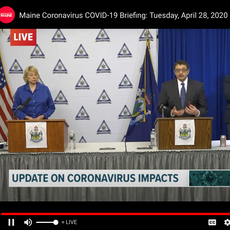
Mills unveils plan to reopen Maine economy in stages, but not 'flipping a switch'
 Screen shot / News Center Maine
Gov. Janet Mills, left, and DECD Commissioner Heather Johnson, at Tuesday's press conference in Augusta unveiling a plan to reopen Maine's economy in stages.
Screen shot / News Center Maine
Gov. Janet Mills, left, and DECD Commissioner Heather Johnson, at Tuesday's press conference in Augusta unveiling a plan to reopen Maine's economy in stages.
More Information
Hair salons, barber shops and pet groomers will be able to open Friday with appropriate safety precautions while hotel, bars and spas will have to wait until July or August, under a plan unveiled by Gov. Janet Mills on Wednesday.
Billed as a safe, gradual plan to reopen Maine's economy as the COVID-19 curve appears to be flattening, the plan was accompanied by an extension of the statewide stay-at-home order through May 31. The new "Stay Safer at Home" order, due to be issued Thursday, will continue to have Maine people remain in their residences, with limited exceptions such as grocery shopping or exercising.
But "Stay Safer at Home" will also allow Mainers to visit businesses that have a green light to open in Stage 1 of the plan. Besides barber shops, hair salons and pet grooming facilities, they include health-care providers, drive-in movie theaters, houses of worship, many outdoor activities and golf courses.

State parks, state-owned public land trails and historic sites can also open as of Friday, although certain coastal state parks are to remain closed.
"With this plan, we are beginning to invent a new normal," Mills said at Wednesday's press conference in Augusta, joined by Heather Johnson, commissioner of the state Department of Economic and Community Development Department, and Nirav Shah, director of the Maine Center for Disease Control and Prevention.
The plan foresees reopening the economy in four stages, the last of which has an undetermined timeline.
But Mills underscored that the entire plan is subject to adjustments, whether it's a return to more restrictions due to a surge in COVID-19 cases, or an acceleration prompted by innovation and greater testing capacity.
'Not flipping a switch'
"We're not flipping a switch today from closed to open," she said. "We are adjusting the dial, easing some restrictions while adding others." She also said that "plans are just plans," and that this is uncharted territory.
"There's no pandemic playbook, no COVID-19 manual," Mills noted. "Things will be confusing because this is complicated. That's OK. We will be flexible, we will be resilient, and we will get through this by doing our part" to protect places, people and the state we call home.
Dana Connors, president of the Maine State Chamber of Commerce, expressed concern about keeping the 14-day quarantine requirement for people entering or returning to Maine in June, July and August, as prescribed in the plan, and its potential negative impact on Maine's tourism. He said his organization will work closely with the DECD on possible adjustments, and gave a shout-out to Johnson for being forthcoming in her efforts to do that.
"We're trying to find a way to be able to appreciate and respect the public health, but at the same time recognize the value that tourism has to our economy," he told Mainebiz in a telephone interview Wednesday morning.

As the plan progresses, the Maine CDC will track three main buckets, as Shah put it, in evaluating whether it's safe or not to move ahead. They are: a downward trajectory of influenza-like illnesses and COVID-like cases; a downward trajectory of documented cases and newly hospitalized cases; and Maine hospitals' capacity to treat all patients without crisis care and the state's ability to engage in a robust testing program.
Shah also said the state would look to expand its team of contact tracers so that anyone infected can be quickly isolated and not spread infection to others and to ensure hospital preparedness. "We need to aim higher," he said.
"Even though we are trending in the right direction right now, there is the possibility that things could go back and would have a spike." And any spike or resurgence would alter plans to restart the economy.
Responding to questions later, Johnson said that science may change the timeline.
Business checklists and badges
By the end of Wednesday, the DECD will have COVID-19 Prevention Checklists ready for all businesses allowed to reopen Friday under Stage 1, according to Johnson.
Once completed, businesses that commit to complying with the checklist requirements will get a badge to post on their business door or website, and also have their names posted on the DECD website and will be allowed to open. Health care providers in Maine will follow guidelines of the U.S. Centers for Disease Control and Prevention and professional associations.
"I don't think there will be a lot of confusion" over the checklist requirements, Johnson said.
But Mills emphasized that receiving a badge, a "Good Housekeeping Seal of Approval," doesn't preclude all individuals from taking their own precautions like wearing a face covering in pubic settings where physical distancing is a challenge, as required under the new order.
"Everyone has to be responsible," she said.
Asked whether she's concerned about a negative impact on tourism in Maine, Mills said, "I think it's important to recognize there will be inevitable losses."
She also said the state is trying very carefully to balance the economic and the epidemiological data and that the entire reopening plan will be dictated by data and science.
Mainebiz web partners
The idea that the State can centrally plan a business resurgence is fatally flawed. The plan as proposed will lead into a prolonged and unnecessary economic downturn. The staged reopening means we will not achieve herd immunity and sets the state up for a second wave of SARS CoV-19 infections. We are sacrificing our young people to save a very small number of the extremely old.













1 Comments